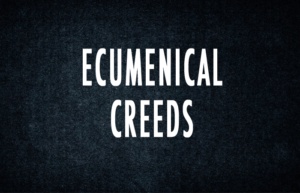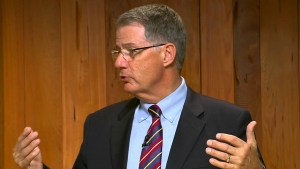As I am (for CH601 Ancient Church, this fall) then I heartily recommend Michael Holmes’ (third) edition of The Apostolic Fathers. We don’t have it in the bookstore yet (it only occurred to me today to ask them—I’ll let you know when . . . Continue reading →
Ancient Church
The Family of Jesus on the Kingdom of God
From Eusebius’ Historia Ecclesiae 3.19-20: But when this same Domitian had commanded that the descendants of David should be slain, an ancient tradition says that some of the heretics brought accusation against the descendants of Jude (said to have been a brother . . . Continue reading →
Bob Godfrey Lectures on the Ancient Church
W. Robert Godfrey has taught church history at the seminary level since 1974. As I like to point out, I was in Jr High (which was Middle School used to be called) when Bob started teaching. Antiquity, however, is useful in teaching . . . Continue reading →
1 Clement On Justification
CHAPTER 31: THE MEANS BY WHICH OBTAIN DIVINE BLESSING Let us cleave then to His blessing, and consider what are the means of possessing it. Let us think over the things which have taken place from the beginning. For what reason was . . . Continue reading →
Roman Emperors In Early Christianity AD 69–211
Location Caesar Reign Notable Rome Galba/Otho/Vitellius 69 murdered/suicide/murdered Rome Vespasian 69–79 ___ Rome Titus 79–81 Destroyed Jerusalem 70 Rome Domitian 81–96 Persecuted the Ap John et al Rome Nerva 96–98 ___ Rome Trajan 98–117 corr. w/Pliny Rome Hadrian 117–38 ___ Rome Anton. . . . Continue reading →
CH601 Ancient Church
Course Description A study of the developing theology, ecclesiology, piety, and worship of the Christian church from the close of the apostolic age to 450 A.D. Special attention will be given to primary sources. Fall semester. 2 credits. Course Goals —Academic Goals: . . . Continue reading →
Contra Natalis Solis Invictis
CHRISTMAS (from Old English Cristes maesse “Christ’s mass”).† Observance commemorating the birth of Jesus. In the Western church, the Feast of the Nativity of Our Lord was first celebrated on December 25 ca. A.D. 336, the date apparently chosen to counter the . . . Continue reading →
Turretin: Who Are The Church Fathers, When Did They Live, and What Authority Do They Have?
Are the writings of the fathers the rule of truth in doctrines of faith and in the interpretation of the Scriptures? We deny against the papists I. Although from the preceding question we are already satisfied that the fathers cannot sit as . . . Continue reading →
Ad Diognetum On Harmony Of All The Parts Of Scripture
11:6 Furthermore, the reverence of the law is sung, and the grace of the prophets is recognized, and the faith of the gospels is established, and the tradition of the apostles is preserved, and the joy of the church exults. Ad Diognetum . . . Continue reading →
Cyprian: Baptize Infants (253 AD)
2. But in respect of the case of the infants, which you say ought not to be baptized within the second or third day after their birth, and that the law of ancient circumcision should be regarded, so that you think that . . . Continue reading →
Another Particular Baptist Wrinkle: The Early Church Baptized Infants But For The Wrong Reasons
Introduction Sean writes with a question that I have received at least once before. Thus, I take it that this is an argument that is mooted in Particular Baptist circles: The argument comes from Particular Baptists and in essence says that while . . . Continue reading →
Cyprian Appealed To Colossians 2:11-12 In His Explanation Of Infant Baptism
For in respect of the observance of the eighth day in the Jewish circumcision of the flesh, a sacrament was given beforehand in shadow and in usage; but when Christ came, it was fulfilled in truth. For because the eighth day, that . . . Continue reading →
Doubts About Political Theology And The Church As A Lever Of Cultural Influence
Tish Harrison Warren, a priest in the ACNA (a denomination in the Anglican tradition), writes in Christianity Today, We have an impoverished and inadequate political theology. It took us generations to get here, and this one election, regardless of the results, will . . . Continue reading →
The So-Called “Celestial Flesh” Christology Is Just Gnosticism
But, according to [the Gnostics], neither was the Word made flesh, nor Christ, nor the Saviour (Soter), who was produced from [the joint contributions of] all [the Æons]. For they will have it, that the Word and Christ never came into this . . . Continue reading →
New Resource Page: The Ecumenical Creeds
The word ecumenical means universal and the ecumenical creeds are the church’s articulation of the universal (or, in that same sense) catholic faith taught in Holy Scripture and confessed by the church since the time of the apostles. The apostolic church itself . . . Continue reading →
What If What The Church Needs Is Not A New Christendom?
Christianity is greatest when…
Continue reading →
Polycarp: A Model For Ministry In The Post-Christian West
Polycarp (Πολύκαρπος), whose name might be translated as fruitful was the leading pastor (ἐπίσκοπος) of Smyrna (today, Izmir, Turkey) on the Agean coast of Asia Minor. We do not know a great deal about his life. He was friends with Ignatius, the pastor of Antioch, who was (presumably) martyred about AD 115. Continue reading →
Gregory of Nyssa Against The Chiliasts
Now if we loudly preach all this, and testify to all this, namely that Christ is the power of God and the wisdom of God, always changeless, always imperishable, though He comes in the changeable and the perishable; never stained Himself, but . . . Continue reading →
What’s Going On Right Now: Sex, Race, Politics, and Power with Dr. W Robert Godfrey (3)
In this third session of Dr. Godfrey’s Sunday school class at the Escondido URC, he develops how Christianity fared under Christendom. He explains the trajectory of challenges Christianity faced as it became wealthy and influential and, sadly, moved away from the gospel. . . . Continue reading →
The St Nicholas Of History (Sort Of)
After the recent Heidelcast episode on Christmas and Santa Claus, Brad Isbell reported that his better half asked something to the effect of, “but what about the real St Nicholas?” This is a great question and one that I have intended to . . . Continue reading →






